Great step forward in cooperation with international humanitarian and human rights organizations. Nataliia Yashchuk and Mykhailo Savva on the diplomatic mission to Geneva
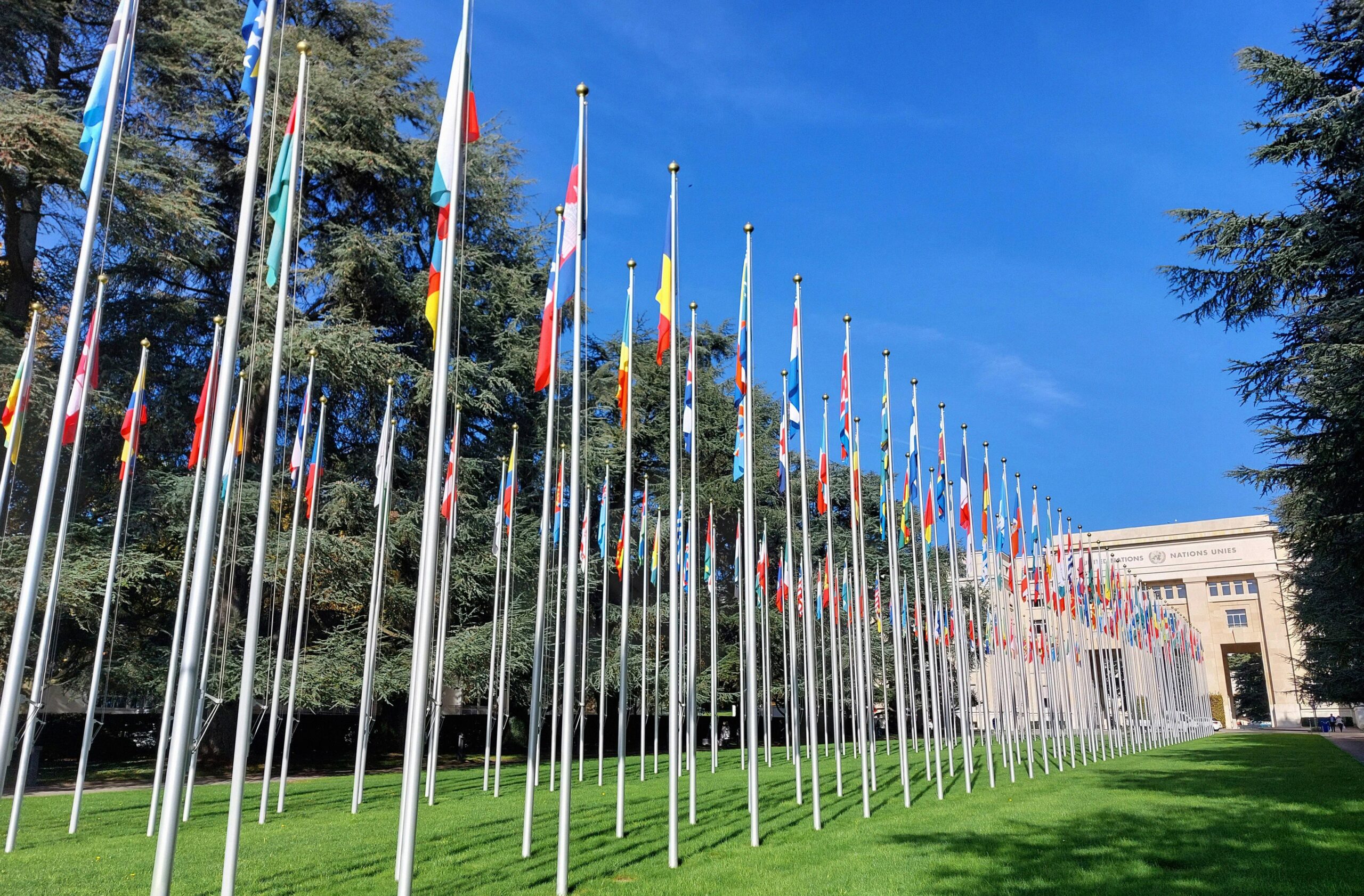
On June 16-22, Natalia Yashchuk, Project Manager of the Civil Rights Center, and Mykhailo Savva, expert of the organization, made a working trip to Geneva. Together with other members of the Ukrainian delegation, they visited UN committees and working groups. They held a number of meetings, including with the Pope’s Mission to the UN, the Human Rights Committee (CCPR), and the team of the Working Group on Discrimination against Women and Girls. We will tell you why this trip was necessary, with whom we succeeded in communicating, and what the results of this communication are for the whole of Ukraine.
The Ukrainian delegation consisted of project manager Natalia Yashchuk and expert Mykhailo Savva from the Center for Civil Liberties. The Ukrainian Helsinki Human Rights Union was represented by its Executive Director Oleksandr Pavlychenko, and the Sova Expert Group was represented by Larysa Pilhun, Deputy Chair of the Board, a specialist in monitoring and evaluation of social projects.
The purpose of the trip was to help solve humanitarian problems related to the violation of the rights of Ukrainian civilians and prisoners of war in Russian captivity. It’s also about raising awareness and addressing the issue of filing complaints with the Human Rights Committee. In many cases, these complaints are rejected. Meetings with several international organizations were also organized to help achieve this.
Permanent Observer Mission of the Holy See to the United Nations (UN)
We discussed the Pope’s initiative to free prisoners of war and civilians with the Deputy Permanent Representative, Cardinal Mendoza. He announced it at this year’s Catholic Easter. And so we had a proposal for a concrete plan of what can be done now on the initiative of the Vatican.
First, they were made aware of the issue: the persecution of religious and clerical figures in the occupied areas, the murder of clerics and representatives of various religious communities. Then we gave them the report of the partner organization for the years 2022-2023 on the war crimes committed on the grounds of religion. We also told them about Russia’s persecution of Orthodox clergy of its patriarchate, even their arrest without trial and detention for a certain period of time, as in the case of Konstantin Maksymov.
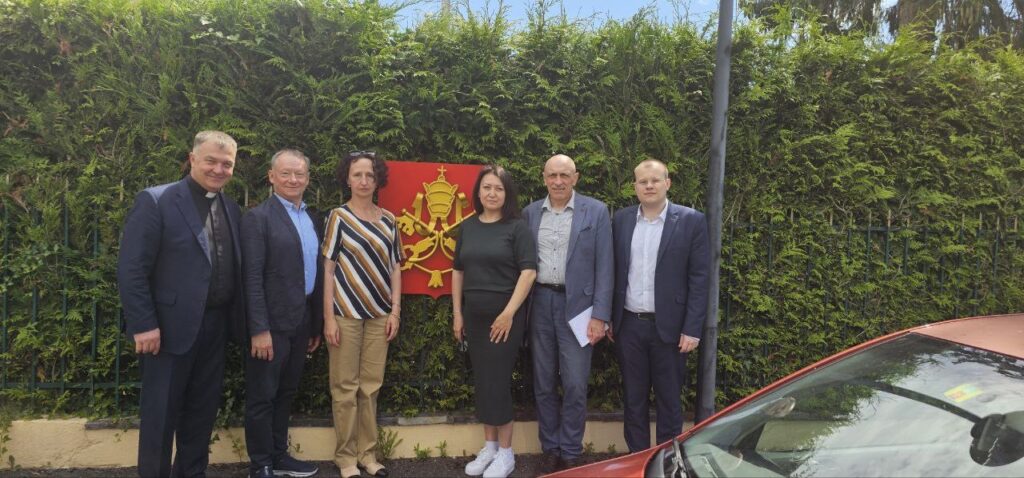
Our main demand was to draw the attention of the Vatican to the persecution of religious figures, Catholic and other, as well as civilians who are illegally detained in Russia and the occupied territories. The Vatican has a representative office in Moscow, so they have the opportunity to intervene in the situation and use the authority of the pope for the improvement of the conditions of detention and release of people. They have not done so to date, and we have urged them to take action.
We also talked about having met with the Pope on two previous occasions. The first was with volunteers of the Center for Civil Liberties in April 2022. The second was in the spring, in which the head of the Center for Civil Liberties, Oleksandra Matviichuk, took part. The previous meetings with the Pope paved the way for further actions. During the meeting with Cardinal Mendoza in Geneva we tried to direct our partners to solve specific problems. In particular, we handed over the strategy for the release of civilians, so that the Vatican could understand where and when it could be effective in facilitating the release of people.
First of all, we asked to alleviate the fate of our people who are imprisoned. Humanitarian and pastoral assistance to our people is important so they understand that we are here looking, waiting and fighting for them.
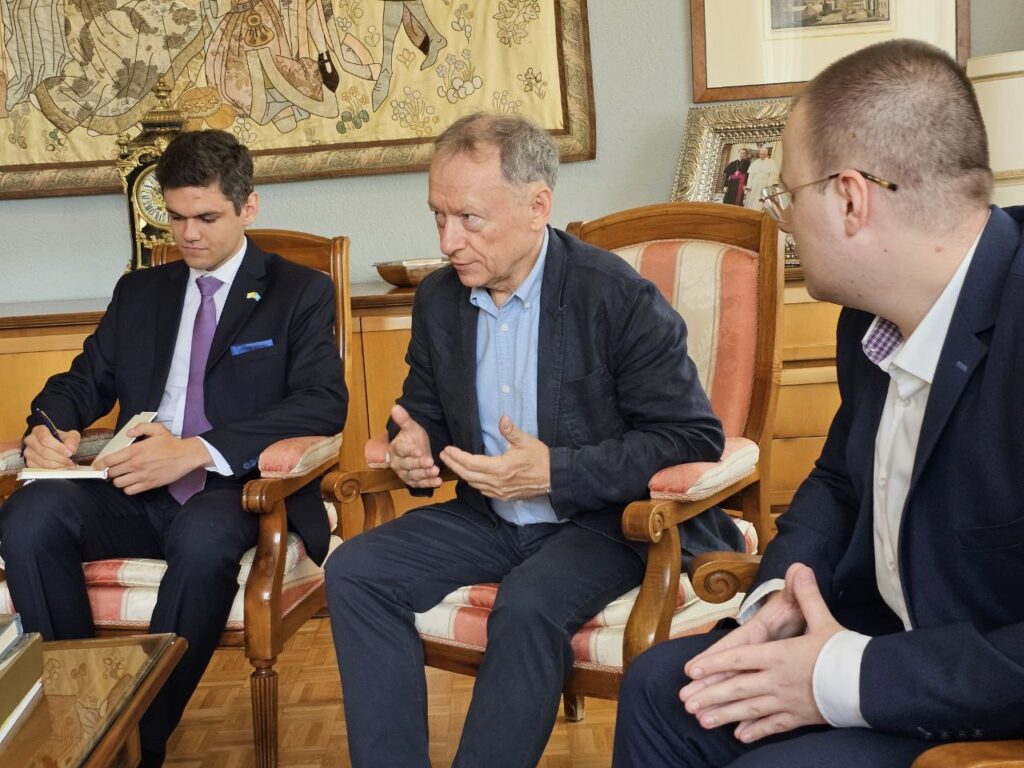
Meeting with Ms. Mariana Katsarova, Representative on Human Rights in Russia
The day of the meeting was a religious holiday in Geneva, the Muslim Eid al-Adha. The Human Rights Committee was closed. So our delegation came across a closed door, but we did not get confused and decided to meet anyway, so we did it in a Zoom conference under the Human Rights Committee building.
During the meeting, they raised the issue of torture of civilians unlawfully detained. They also discussed the latest goings-on in the Rostov-on-Don detention center, where representatives of the Russian National Guard and Russian special services killed prisoners during a riot. This was followed by beatings of everyone in the detention center, with a particularly cruel attitude towards Ukrainians. That is why we emphasized that there is not only a continuation of torture, but there is an intensification of torture and pressure on people in Russian prisons and jails.
We not only communicated but also sent a prepared message. For example, concerning the events in Rostov-on-Don, we were in contact with 28 human rights organizations in the OSCE region. A few days before going, we received a significant number of signatures, which allowed us to speak not only on our own behalf, but also on behalf of the human rights community in the region.
In addition, we have shared recorded and documented evidence of torture, ill-treatment, and torture in places of detention. These are testimonies of civilians who were unlawfully detained and released in the course of negotiations and exchanges. We were also able to document testimonies of people in detention centers and violations and detention of people with lifelong disabilities.
Later, we did a specific description of these cases and handed these documents to Mariana Katsarova in accordance with the protocol of the Human Rights Committee. We expect that the issue will be on the agenda of the UN Human Rights Council meeting in Geneva and also at the UN General Assembly.
The problem of the algorithm of searching for missing persons
Negotiating with representatives of international organizations, we found several problems that prevent us from obtaining information about all those who are detained or illegally deprived of their freedom in the Russian Federation and the occupied territories. For example, it turned out that in Russia, the National Information Bureau operates under the Ministry of Defense and does not co-operate with other Russian authorities. It is a fact that this information bureau does not have any information about civilians and does not report it, for example, to the International Committee of the Red Cross. This leaves thousands of people in the harsh conditions of Russian prisons without communication and protection, which is a huge problem. During the meetings, we presented evidence of the lack of correspondence with the relatives of people already confirmed to be in captivity. We also presented a petition for the restoration of correspondence, signed by more than a thousand Ukrainians.
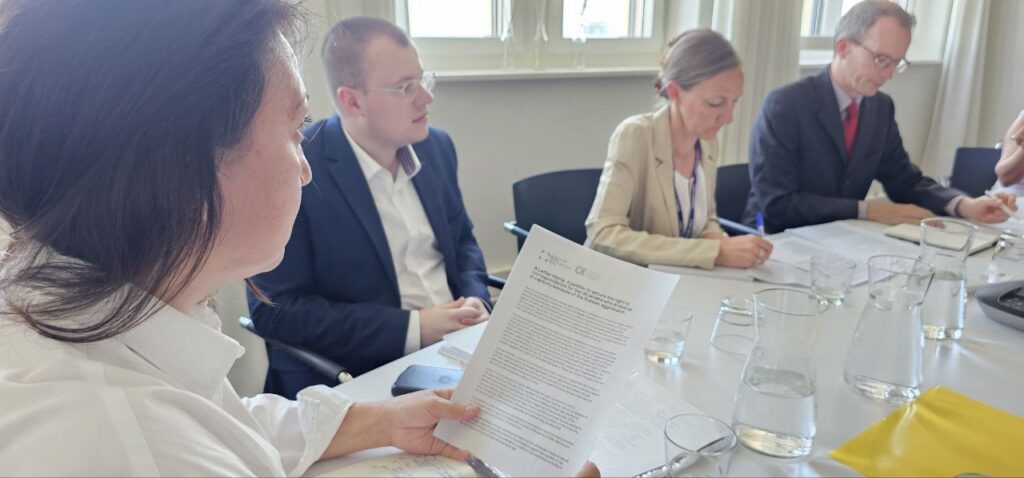
Permanent Mission of Ukraine to Geneva
Ambassador Yevheniia Filipenko was the host of the Ukrainian delegation. We had a fruitful meeting in which certain agreements were reached. We told her about the purpose of visiting Geneva, about the meetings already held and those that are planned to be held. Ms. Yevheniia fully supported us. We agreed to stay in touch and support our activities related to the UN. The first such event will take place on July 4 in Geneva — a side event during the 56th session of the Human Rights Council. Our delegation will come and talk about illegally detained civilians, the problem of searching for them, establishing their whereabouts, as well as their confirmation and return.
Ms. Yevheniia noted that since Ukraine is very little heard in the UN offices and in other countries, it would be good if we, representatives of the public sector, could physically give them our materials. We discussed ways to combat this problem, noting that the authorities of some countries are “tired” of the Ukrainian agenda.
We need to think strategically about changing the format and saying not “Action in support of Ukraine” but “Action to draw attention to the issue of missing persons on the basis of the Ukrainian experience”. We need to show that we are in this together and that we are not only doing this for ourselves, but that we are doing this for other countries as well. Finally, conflicts of various levels take place in more than 20 countries.
Yevhenia Filipenko has been absolutely supportive of us in this regard, and our hope is that in the future this will be transformed into some kind of interaction and that Ukraine will eventually be perceived as an ally of other countries with similar problems. In fact, we are not only talking about our own problems. The Ukrainian mission is ready for communication with Ukrainian human rights organizations.
Mrs. Ambassador also informed that she continues to communicate with the families of those imprisoned. By the way, during the rally of relatives of prisoners of war in front of the main UN building in Geneva, our delegation managed to get there. Our hearts were warm when we saw a bunch of Ukrainian flags from a distance. And when people that we knew saw us, there were hugs that were unbelievably strong. The demonstrators were tired and angry because they had been standing under the hellish sun for hours and had been shouting slogans for hours. Our thanks to them for the fulfillment of a very important mission. As a matter of fact, they are outlining the problems for us as a human rights organization.
Meeting at the UN Human Rights Committee with Ms. Gabrielle Hapt, Ombudsman and Secretary of the Human Rights Committee
The meeting was also attended by the staff of the Secretariat, which receives the first complaints of unlawful actions against people. It was a productive meeting. Oleksandr Pavlichenko spoke the most because his lawyers were working and filed numerous complaints. We learned about the mechanisms of filing complaints and what to consider when taking the first step in communicating with the Committee.
We arranged an online meeting with representatives of the Secretariat. They will train our lawyers on how to submit complaints properly so that they’ll be accepted. A lot of resources, time, and effort go into preparing these documents, and sometimes they are rejected. If they are rejected, that person cannot file a second complaint. And that is very bad. Because war crimes have many precedents, including against civilians. Therefore, to protect the violated rights of Ukrainians, a proper understanding of how to file the first complaint is a strategically important step.
We spoke about the case of 30-32\2017, which is related to violations of the International Covenant on Civil and Political Rights, specifically the forced transfer of a prisoner from his country of origin and the forced naturalization of a prisoner. Our human rights lawyers Roman Martynovskyi and Serhii Zaiats won the case, and this is a great precedent because it gives us hope that Ukraine’s cases will be taken into consideration and that there will be certain decisions in the future. They also told us about various international mechanisms and instruments that we can use to file cases against Russia and to report on the human rights violations that were committed during the Russian aggression. We are now corresponding with them and are going to set a date for training the lawyers.
High Commissioner’s Working Group on the Elimination of Discrimination against Women and Girls
We met with experts who told us about war crimes against women, persecution of women in the occupied territories, detention in detention centers, torture, and so on. We did not talk about conflict-related sexual violence, because we do not have expertise in that area. However, we know the relevant organizations and have submitted materials from them to this working group. An important issue was the adherence to the mechanism of appeal to the group and the mechanism of review of the applications received. We also agreed to keep in touch and to wait for the materials and links on what we should pay attention to and where we should send the specialized organizations in Ukraine.
Meeting with the Swiss Helsinki Committee for Human Rights
We have also taken advantage of this trip to find new partners in civil society. First of all, among human rights organizations. And since Switzerland is the country where most of the UN structures are located, the Swiss Helsinki Committee is an interesting partner. We need to have a civil society partner there.
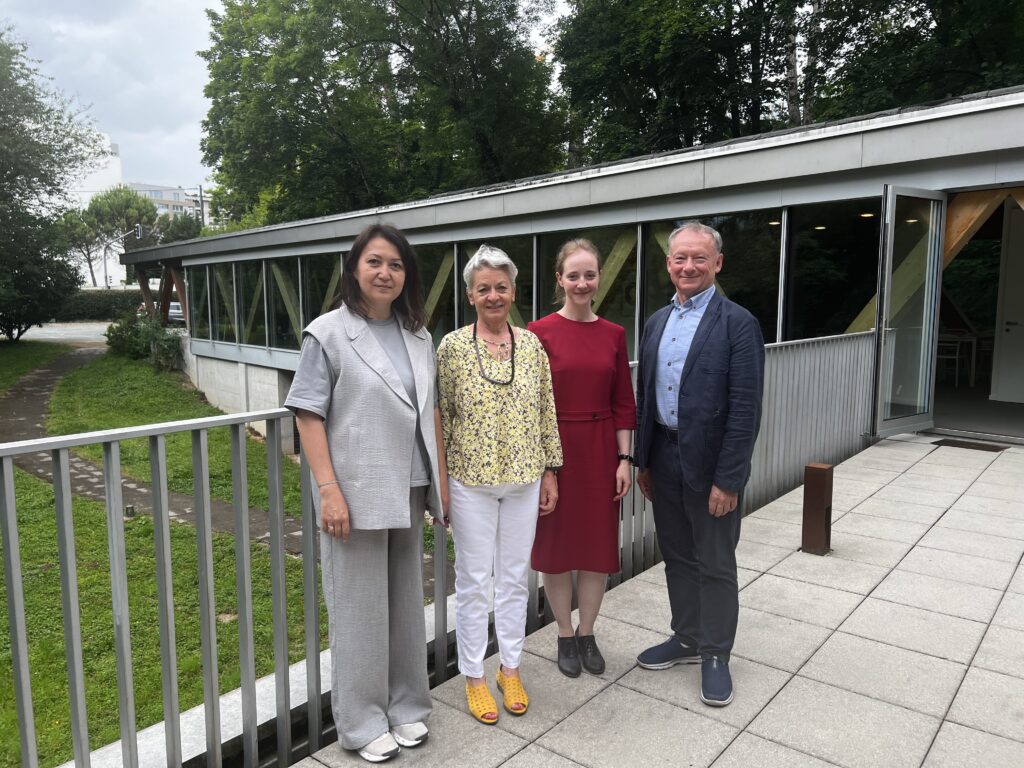
We have seen that even organizations working in the field of human rights protection know very little about the real situation in Ukraine. And even less about the systematic violation of human rights by the Russian Federation. We have to keep talking about it. And that gives us new allies. New allies are the people who will take part in the events at the United Nations in Geneva and who will distribute information materials. There are many ways to cooperate.
Meeting with the UN High Commissioner for Refugees
The main category of appeals to him are people who are under occupation and are trying to get out. For example, to go to liberated territory or to another country. And as a result, people disappear or are imprisoned. The ombudsman is the right structure to contact in order to get information about this and to record the violations that are taking place in the occupied territories and in the Russian Federation with Ukrainian citizens. They are both displaced children and civilians. We agreed to keep in constant contact with them and to keep them informed about the violations that are happening in the occupied territories and have become very well known.
Outcome
The most important strategic result is that we agreed to continue the communication. In addition, our partners suggested it to us. This is a recognition of the efforts of Ukrainian civil society as a whole. We informed the heads of the organizations we visited about specific problems encountered. We brought, gave and commented on numerous specific cases, so we hope that international organizations will respond to these cases. We hope that international organizations will respond. For example, an inspection to see this person in Russian captivity. It is still difficult to assess the practical result of our work in Geneva because little time has passed and this is long-term work. At the same time, some of the events that have taken place since our return give us hope that the situation will improve with the release of the civilians. We should also note that we have not received any rejection of our proposals. This is a huge step forward in our cooperation with international humanitarian and human rights organizations.
Center for Civil Liberties operates with the support of the European Union.

